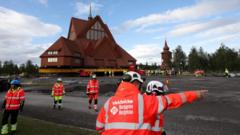The recent heavy monsoon rains in Mumbai have left the city grappling with severe flooding, transportation delays, and public safety concerns. Rescue efforts have seen nearly 600 individuals freed from an overcrowded monorail, highlighting the city's infrastructure challenges. Political leaders and citizens are raising concerns over the government's preparedness and planning amidst the crisis.
Mumbai Faces Catastrophic Disruptions Due to Record Monsoon Rains

Mumbai Faces Catastrophic Disruptions Due to Record Monsoon Rains
Heavy rainfall inundates India's financial hub, leading to widespread evacuations, transportation chaos, and increasing calls for government accountability.
Heavy rainfall has wreaked havoc in Mumbai, India's financial capital, plunging the city into chaos as streets become submerged and essential services are disrupted. The relentless downpour has left many areas knee-deep in water, with alarming scenes of residents navigating through waterlogged streets while debris flowed from overworked drainage systems. Authorities have responded by rescuing approximately 600 individuals trapped on an overcrowded monorail, with reports indicating that 23 passengers required medical attention for suffocation.
Civic officials reported that critical infrastructure including schools and colleges largely remains closed, while 350 residents from vulnerable low-lying regions have been moved to temporary shelters. The India Meteorological Department has issued a red alert for the area, anticipating further heavy rainfall. Despite this, it is projected that conditions may improve later in the week.
The rainfall in Mumbai has reached unprecedented levels for this time of year, with 800mm recorded over a span of just four days—significantly above the typical August rainfall. The heavy weather has been attributed to the annual monsoon season, which traditionally impacts the region but has brought intensified rainfall this year. Unfortunately, this has resulted in the deaths of at least 21 individuals during the last few days due to rain-related incidents.
Public transportation has taken a hit, with Mumbai's local trains—crucial for millions of commuters—severely impacted and causing thousands to wait on platforms amid delayed services. In addition, air travel has faced disruptions with reports of cancellations affecting around 50 flights, prompting budget airlines like IndiGo to prepare passengers for potential delays due to expected inclement weather.
The flooding crisis has spurred widespread discontent among citizens and opposition parties, who are criticizing the government for lack of preparedness. Notably, Aaditya Thackeray, a prominent leader from the Shiv Sena (UBT) party, has characterized the situation as an "absolute collapse of governance," asserting that the administration's response was insufficient despite being aware of red alerts. Many residents have taken to social media to voice their frustrations regarding the deteriorating infrastructure and inadequate planning that have seemingly failed to keep pace with the metropolitan population's needs.
As Mumbai contends with the immediate challenges posed by this deluge, the event raises concerns about the city's long-term resilience against climatic challenges. Despite significant investments in various infrastructure projects, experts assert that a focus on modernizing the aging drainage system and creating climate-adaptable architecture is crucial to mitigating future disasters.


















